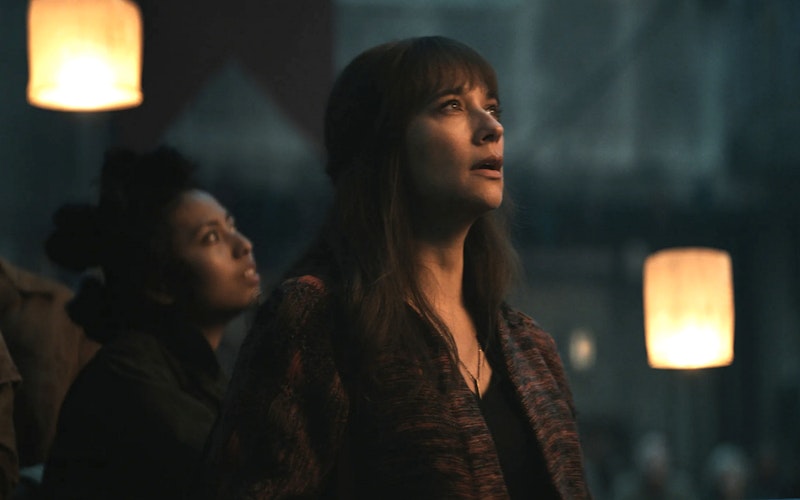
TV
Silo and Sealing Off Our Faith
In his 2012 Christianity Today essay, “Sci-fi Spirituality,” Ryan Hamm observes that science fiction can “be a conduit to ask serious questions about faith, religion, purpose, destiny, and what, exactly, it means to be human.” It follows that wise and wonderful Christian authors from C.S. Lewis to Madeleine L'Engle have used sci-fi to stealthily reframe our deepest theological questions.
Apple TV’s new series Silo wields this interrogative power like a sledgehammer. This dark adaptation of the popular book series by Hugh Howey sports an amazing cast, high production values, and a gripping story about a post-apocalyptic society that has literally been driven underground by an unexplained and unremembered environmental catastrophe. Adapted for television by the brilliant and prolific Graham Yost, Silo takes full advantage of its dystopian setting to explore matters of ultimate concern. In particular, the series offers viewers insights into the pitfalls of practicing faith without reason and the dangers of following secretive leaders who govern primarily through fear.
We learn early on that citizens of the Silo who refuse to adhere to the strictures of their closed society at best fail to thrive and, at worst, die. Outlined in a complicated document called The Pact, a text somewhere between the Old Testament and the United States Constitution, prescriptive rules govern every aspect of daily life. In an Orwellian twist, the state secretly prevents spunky IT worker Allison Becker (Rashida Jones) from getting pregnant because she asks too many questions; they literally want to breed out dissent from their intentional community. Flagrant apostates to The Pact eventually endure a macabre ritual known as being “sent to clean,” in which the 10,000 citizens of the Silo gather around grainy video screens to watch antisocial offenders expelled to the surface world in hazmat suits. After cleaning the dust off the exterior camara, the banished souls soon die in full view on the barren landscape. Their bodies remain visible on video feeds, perpetual warnings against willful nonconformity.
The success of this strict social contract relies on the citizens trusting their leaders to do all of the thinking. Generations ago, so the official story goes, the Silo barely survived a violent uprising, in which terrorists allegedly put the survival of the fledgling civilization at risk. As part of the purge, all records of life from the “before times” were destroyed. Over a century later, the repressive government still prosecutes any attempt to learn about the lost history or the outside world. Material objects from the before times, known as “relics,” are especially verboten. Anyone possessing a relic, whether it be a mysterious hard drive, a broken camcorder, or a comically threatening Pez dispenser, faces strict prosecution from Judicial—a shadowy and unaccountable branch of government led by Robert Sims (Common). The system governs through fear.
The success of this strict social contract relies on the citizens trusting their leaders to do all of the thinking.
Silo’s depiction of a community where citizens cannot question authority should ring a cautionary note for Christians. Jesus famously preached that “the truth will set you free,” but the freedom to pursue the whole truth does not exist in the Silo. Truth derives solely from black and white proof-texting of a singular text. Episode 6 contains a scene in which Paul (Chinaza Uche) shows off his rote memory mastery of The Pact to his reluctant supervisor, Juliette (Rebecca Ferguson). Paul’s gentle brag about the multiple contests he won as a youth reminded me of the “Bible sword drills” my evangelical friends competed in during high school. But what if the truth cannot be easily distilled to a literal, robotic, and contextless application?
The Belgic Confession, a creed of the Reformed tradition, upholds the divine revelation of sacred texts while also offering Christians a supplemental path towards truth. As stated in Article Two: we know God not only through the divine revelation of Scripture, but also “by the creation, preservation and government of the universe, which is before our eyes as a most elegant book, wherein all creatures, great and small, are as so many characters leading us to ponder the invisible things of God.” For the inhabitants of the Silo, the rich beauty of God’s creation remains off limits; they cannot know or even talk about it. Whenever evidence of the beauty and complexity of the outside world comes to light, the authorities predictably panic and punish.
Unfortunately, a case may be made that a similar pattern of fear and retaliation also increasingly pollutes a segment of contemporary Christianity. Whether it be the age of the earth, the science behind gender, or the history of racism, many well-meaning Christians of today live in fear of the general revelations offered by science or documented through history. Instead of faithfully seeking the truth, books are banned or the validity of science is denied. Likewise, the bevy of recent docuseries chronicling the disturbing leadership practices within high-profile yet secretive Christian communities (Shiny Happy People and The Secrets of Hillsong) powerfully testify to the inherent dangers of blindly following leaders who refuse to be questioned.
Seven episodes in, I do not know where Silo will lead. (I haven’t read the books, but I started watching because Howey’s acclaimed novels meant so much to my wife and son ever since Wool broke through the self-publishing bubble in 2011.) Regardless of how things turn out, this cautionary adaptation has succeeded in reminding me that “siloing” ourselves off from our troubling past and the complexity of God’s creation will, in the long run, likely damage rather than strengthen our collective faith. In the pursuit of truth, the series also points me to one of the most-repeated lines in the Bible: “Do not be afraid.”
Topics: TV